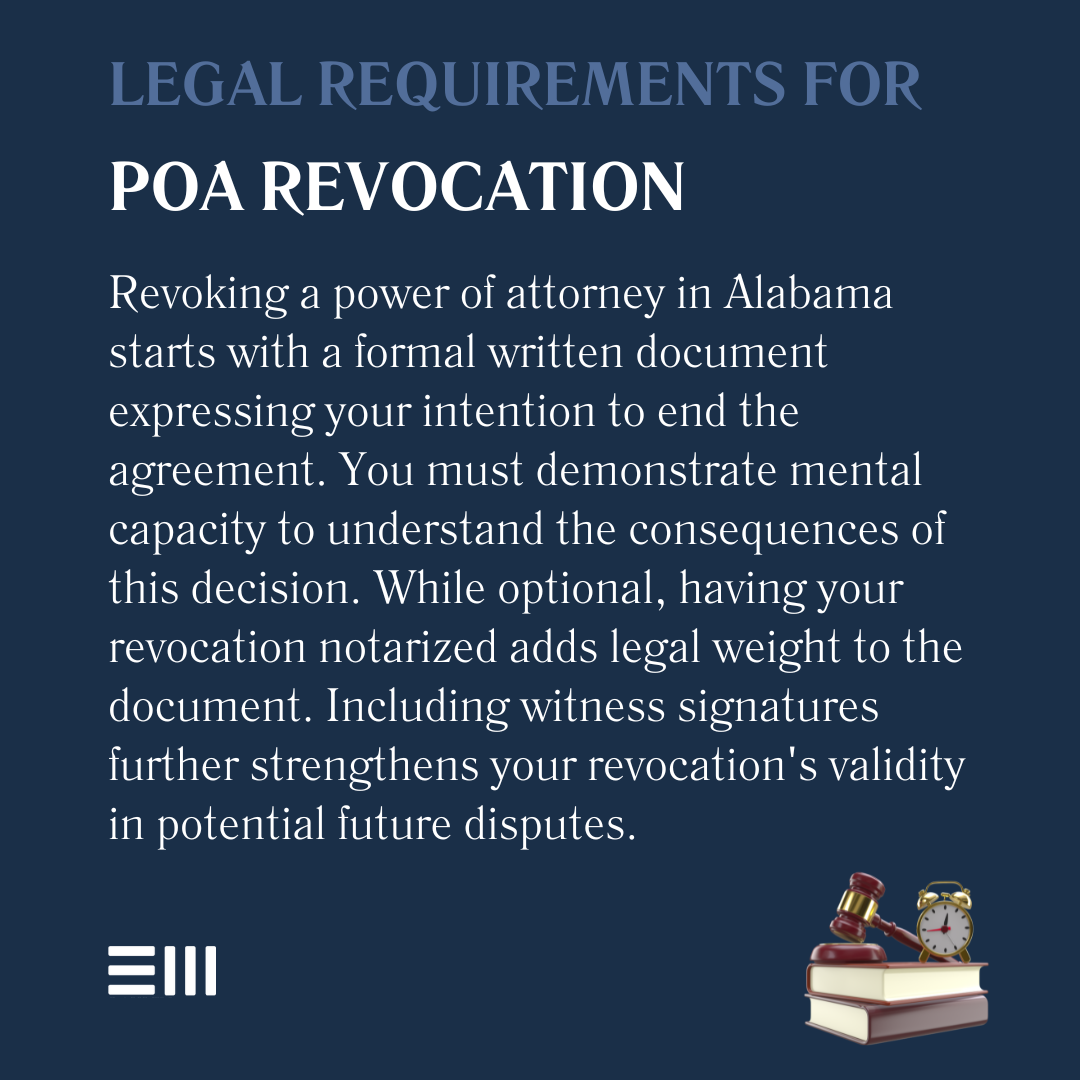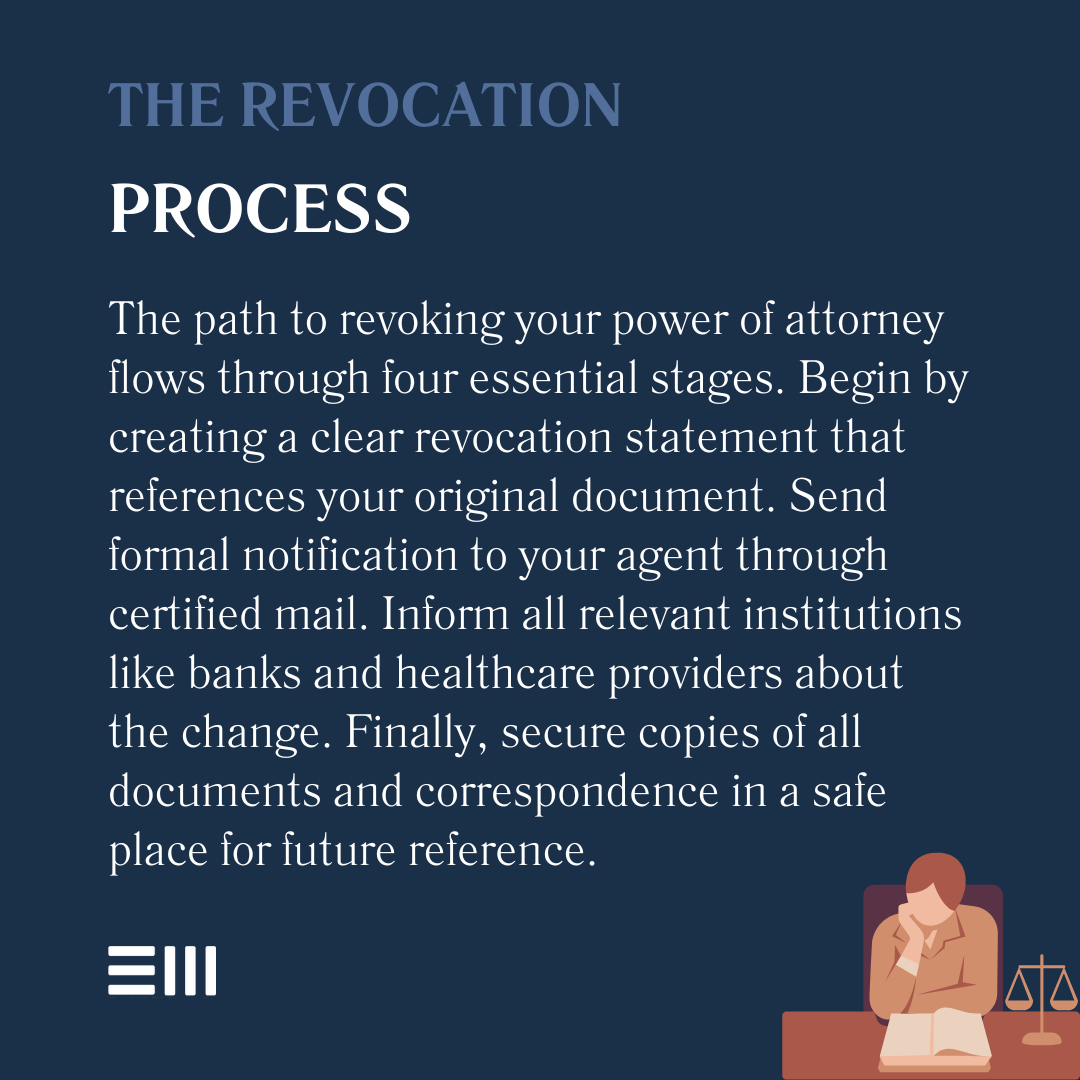Trust forms the bedrock of every power of attorney relationship, yet circumstances evolve, relationships shift, and the need to reclaim control of one's affairs often emerges.
Whether prompted by changing family dynamics, business relationships, or personal preferences, the power to revoke this authority stands as a fundamental right in Alabama law.
For those facing this significant transition, understanding the precise steps and requirements helps ensure both protection and peace of mind throughout the process.
Understanding Power of Attorney Revocation
The ability to revoke a power of attorney represents one of the fundamental rights retained by every principal in Alabama. This legal process allows you to end the authority previously granted to your agent, ensuring you maintain control over who makes decisions on your behalf.
Some powers of attorney end automatically under specific circumstances, while others require formal revocation. Understanding these distinctions helps ensure proper termination of your agent's authority while protecting your interests throughout the process.
Legal Requirements for Revocation
Before initiating the revocation process, familiarizing yourself with Alabama's legal requirements helps ensure a valid termination of your agent's authority.
The state maintains specific guidelines to protect all parties involved.
- Written Documentation: Alabama law requires a formal written document clearly stating your intention to revoke the power of attorney. This document must include specific identifying information about the original power of attorney.
- Mental Capacity: You must possess sufficient mental capacity to understand the nature and consequences of revoking the power of attorney.
- Notarization: While not always required, having your revocation document notarized adds an extra layer of validity and helps prevent future disputes.
- Witness Requirements: Including witnesses to your signature can strengthen the document's legitimacy, though Alabama law doesn't mandate this for most revocations.
Understanding and meeting these requirements ensures your revocation stands up to legal scrutiny and effectively terminates your agent's authority.
Steps to Revoke Power of Attorney
The revocation process involves several key steps to ensure proper termination of your agent's authority.
Following these steps helps prevent future complications and protects your interests.
- Document Creation: Draft a clear revocation statement that identifies the original power of attorney by date and type, and explicitly states your intention to revoke it.
- Notification: Inform your agent formally about the revocation through certified mail with return receipt requested.
- Third-Party Notice: Notify banks, healthcare providers, and other institutions that previously honored the power of attorney about its termination.
- Document Storage: Keep copies of the revocation notice and all related correspondence in a secure location for future reference.
Proper execution of these steps helps ensure a smooth transition of authority back to you or to a new agent if desired.
Common Challenges and Solutions
Revoking a power of attorney sometimes presents unexpected challenges. Understanding potential obstacles helps you prepare effective solutions while maintaining your rights.
- Resistant Agents: Some agents may resist relinquishing their authority, requiring clear communication and possibly legal intervention.
- Institution Recognition: Banks or other organizations might need time to process and recognize the revocation, necessitating follow-up.
- Document Access: Obtaining copies of the original power of attorney can prove difficult if not properly stored, making advance preparation important.
- Timing Issues: Emergency situations might require expedited processing, highlighting the importance of understanding fast-track procedures.
Anticipating these challenges allows you to develop appropriate strategies and seek necessary support early in the process.
Alternative Options
Sometimes, alternatives to complete revocation better serve your needs.
Understanding these options helps you choose the most appropriate path forward.
- Modification: Instead of revoking the entire document, you might modify specific powers granted to your agent.
- Limited Duration: Setting a specific end date or triggering event can automatically terminate the power of attorney.
- Co-Agents: Appointing multiple agents who must act together can provide additional oversight without complete revocation.
- Successor Agents: Naming backup agents in advance can facilitate smoother transitions when needed.
Considering these alternatives ensures you choose the most appropriate solution for your situation.
Frequently Asked Questions About Revoking Power of Attorney in Alabama
When considering revoking a power of attorney in Alabama, many questions arise about the process, requirements, and implications.
These common questions help clarify important aspects of the revocation process.
What Happens to Transactions After Revocation?
Transactions completed by the agent before receiving notice of revocation generally remain valid, while those attempted afterward become void.
Can a Power of Attorney Be Temporarily Suspended?
Yes, you can temporarily suspend a power of attorney by explicitly stating the suspension period in a formal document.
How Long Does the Revocation Process Take?
The actual revocation takes effect immediately upon execution, but notifying all relevant parties may take several weeks.
Must the Original POA Be Returned?
While returning the original document isn't legally required, requesting its return helps prevent unauthorized use.
Can Someone Else Revoke My Power of Attorney?
Generally, only the principal can revoke their own power of attorney, except in cases of court intervention or death.
Taking Control of Your Future
Regaining authority over your affairs marks an important step in protecting your interests and ensuring your wishes are honored. Our experienced legal team stands ready to guide you through the revocation process while safeguarding your rights and peace of mind.
Contact us today to discuss your power of attorney concerns and receive personalized guidance for your situation.
Our attorneys will help you navigate the revocation process effectively while ensuring your interests remain protected throughout the transition.


